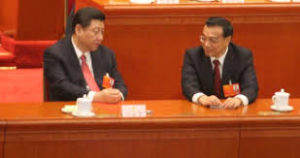In 2016, previously rumoured tensions between the PRC President and CCP Chairman Xi Jinping 习近平 and Premier Li Keqiang 李克强 burst into the open. This marks perhaps one of the most serious rifts at the top of the Chinese Party-state since Deng Xiaoping 邓小平 replaced Zhao Ziyang 赵紫阳 with Jiang Zemin 江泽民 and a cabal of Party elders during the Tiananmen crisis of 1989.
The two leaders have history. Both were mooted as candidates to succeed Hu Jintao 胡锦涛 in the run up to his 2012 retirement. A US diplomatic cable released by Wikileaks recounts a 2007 conversation between Xi — then in charge of Zhejiang province — and then-US ambassador Clark T. Randt, in which Xi goes out of his way to cast his province’s situation in a positive light compared with Henan Province, where Li had only recently been governor. After Xi ascended to the posts of President and CCP Chairman, he quickly consolidated his hold over economic policy — an area that had been the domain of the premier under both Wen Jiabao温 家宝 and Zhu Rongji 朱镕基.
Once in the job, Xi reconfigured high-level power structures to an unprecedented degree. Rumblings that Li and his camp were unhappy with some of the changes popped up sporadically in both Chinese and foreign media before 2016. Then, on 9 May 2016, a front-page People’s Daily essay by an ‘authoritative person’ — widely believed to be top Xi aide Liu He 刘鹤 — directly criticised the credit-heavy economic policies advanced by Li and his team, at length and in detail.
In post-1989 PRC elite politics, in which preserving the appearance of stability and consensus has been paramount, such overt airing of differences would normally constitute an unthinkable breach of protocol. But the Xi–Li feud appeared to escalate over the summer, culminating in Xi’s 3 August public defenestration of the once-powerful Communist Youth League (CYL), which entailed both a halving of its budget and less powerful roles for its cadres and eighty-seven million members.
The CYL was also where Li began his political career in 1982, immediately upon graduation from Peking University. He spent the next sixteen years rising through its ranks, leaving the organisation in 1998 when he took up the post of governor of Henan Province. Former president Hu Jintao, his powerful former aide Ling Jihua 令计划 (who fell victim to a corruption investigation after his son’s death at the wheel of a Ferrari in a weehours crash that also killed two college-age female passengers), and current Vice-President Li Yuanchao 李源潮 also spent large portions of their careers in the CYL. The League’s role in cultivating young cadres has meant that its candidates tend to do disproportionately well in intra-Party elections — an important factor in cadre promotion.
Business as usual would see Li confirmed for an additional five-year term as premier at 2017’s National Party Congress, and serve until his retirement in 2022. But speculation is rife that Li may be the first premier ousted from the role since Deng Xiaoping saw off Hua Guofeng 华国锋 in 1980. A major Party conclave in October indicated that rules around retirement age might be eased at the 2017 Party Congress, thus paving the way for sixty-nine-year-old Wang Qishan 王岐山, a key Xi ally and head of the formidable Central Commission for Discipline Inspection, to step into Li’s role rather than step down into retirement.
Notes
‘US embassy cables: China’s next leader reveals taste for Hollywood movies’, The Guardian, 4 December 2010, online at: https://www.theguardian.com/world/us-embassy-cables-documents/100934
‘A very Chinese coup’, The Economist, 17 October 2015, online at: http://www.economist.com/news/china/21674793-li-keqiang-weakest-chinese-prime-minister-decades-very-chinese-coup
Li Keqiang Baidu Baike entry: http://baike.baidu.com/subview/34021/18032609.htm
Katsuji Nakazawa, ‘In China, a Xi-Wang regime may be on the way’, Nikkei Asian Review, 11 November 2016, online at: http://asia.nikkei.com/Politics-Economy/Policy-Politics/In-China-a-Xi-Wang-regime-may-be-on-the-way



